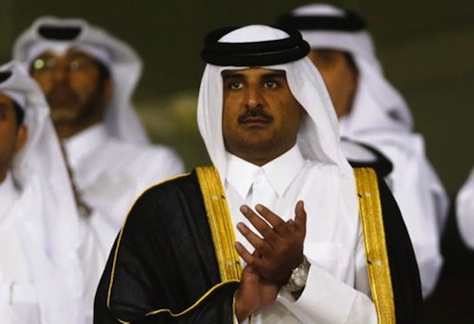Even as a global audience cheers on the 2014 World Cup in Brazil, things are looking increasingly dicey for Qatar, which is struggling to hold onto its successful bid four years ago to host the 2022 World Cup.![]()
Amid complaints about everything from soaring Gulf temperatures to its LGBT laws to the abuses of Qatar’s kafala system, the resource-wealthy emirate now faces losing the 2022 World Cup altogether following allegations that Qatari businessmen bribed members of the Fédération Internationale de Football Association (FIFA).
Needless to say, it’s not been an incredibly smooth first year for Tamim bin Hamad Al Thani, who assumed power as the eighth emir of Qatar when his father, Hamad bin Khalifa Al Thani, abdicated in June 2013 at the age of 61. Though the British-educated Tamim had been the Qatari heir apparent for a decade, at age 34, he is the world’s youngest monarch. Though Shiekh Hamad and other members of the Al Thani family (most notably Tamim’s mother, Mozah bint Nasser Al Missned) continue to wield significant influence, Sheikh Tamim’s rise to power reflects a more seamless transition for Qatar. Sheikh Hamad kicked his own father, Khalifa, out of power in a bloodless coup in 1995.
Though he wasn’t Qatar’s emir at the time, the controversy surrounding the decision to award the World Cup to Qatar has become a major leadership test for Sheikh Tamim (pictured above), who led the Qatari committee that made the bid for the 2022 World Cup. Arguably, Tamim’s most important role before assuming the emirship last year was his influence in building Qatar’s growing sponsorship of regional and global sports events.
Facing a humiliating retreat with respect to Qatar’s regional political agenda, and facing enhanced global scrutiny on all fronts due to the World Cup bid, losing the 2022 tournament would be a massive setback for Qatar’s two-decade push to become an influential regional and global actor. Continue reading 2022 World Cup scrutiny poses major test for Sheikh Tamim
